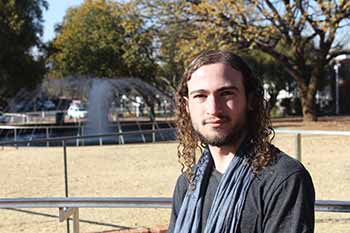Latest News Archive
Please select Category, Year, and then Month to display items
03 October 2024
|
Story Ansie Barnard
|
Photo Supplied
 From left to right: Londeka Mkhwanazi, Semither Mkhize, Salima van Schalkwyk, Slindokuhle Ndlovu, Asanda Mpinga, Mantombi Molefe, Ntombinkulu Khumalo, Mosebjadi Chauke and Thembinkosi Mkhwanazi.
From left to right: Londeka Mkhwanazi, Semither Mkhize, Salima van Schalkwyk, Slindokuhle Ndlovu, Asanda Mpinga, Mantombi Molefe, Ntombinkulu Khumalo, Mosebjadi Chauke and Thembinkosi Mkhwanazi.
The Amrut Foundation, in partnership with the University of the Free State (UFS), successfully hosted its Inaugural Innovathon at the UFS Qwaqwa Campus. This competition is designed to identify and support innovative products and services that not only generate profit but also contribute to the public good, with a strong emphasis on ethical business practices. Through this collaboration, students gain national exposure for their businesses and receive support to create sustainable social enterprises.
Five teams of student social entrepreneurs from the Qwaqwa campus were shortlisted to participate in the regional finals. Their selection was based on ventures that adhered to a social entrepreneurship model and demonstrated plans for long-term profitability and sustainability.
During the Innovathon, a panel of judges from the UFS, the Amrut Foundation, and the Small Enterprise Development Agency (SEDA) selected two outstanding teams to represent the UFS at the national finals, which will take place in October. The winning ventures, Biofly-Pro and Root Rescue were each awarded R20,000 to further develop and expand their initiatives.
Hemang Desai, Executive Director of the Amrut Foundation, expressed his enthusiasm for the event: "Amrut is proud to co-host the Free State leg of the inaugural Innovation Challenge with the UFS. Supporting students with entrepreneurial ambitions that align with societal care is one of our key focus areas."
Dr Grey Magaiza, Senior Lecturer and Deputy Director for the Centre for Gender and Africa Studies at the UFS, highlighted the importance of social entrepreneurship: “Social entrepreneurship is a collaborative effort towards creating sustainable and ethical business processes. The two winning projects embody these principles, and we look forward to their continued growth. In line with our Vision 130, social entrepreneurship can serve as a critical lever for university-community engagement.”
Congratulations to Biofly-Pro and Root Rescue on their well-deserved achievements!
Young language Einstein set for Europe
2017-07-10

Willem Carel Brink will be studying in France and Italy
for the next two years as part of his master’s
degree programme
Photo: Rulanzen Martin
German, French, English and even Latin are just a few of the languages known by Kovsies’ own language guru, Willem Carel Brink.
This arty junior lecturer and 2015 Senate and Dean’s medal recipient at the Department of Afrikaans and Dutch, German and French at the University of the Free State (UFS) received the Erasmus-Mundus bursary to conduct his master’s degree under the Erasmus Mundus Master en Cultures Littératures Européennes (CLE) title. He departs for Europe in September. “It is a structured interdisciplinary study which focuses on European literature, culture and other aspects,” Willem says. The subject for his thesis will be determined during the duration of the course.
Two-year course under Erasmus Mundus
The Erasmus CLE master’s is a two-year course which is presented by five partner universities in France, Senegal, Italy and Greece. Students are expected to indicate at which universities they want to study but cannot spend both years at the same university. “France was my first choice, because I know the language – which was a prerequisite for selection,” said Willem. He is fluent in Afrikaans, English, German and French!
“I will spend my second year in Bologna, Italy,” he said. It is therefore also expected that he does an Italian course during the first year to prepare him for the second year in Italy.
Future collaboration with UFS a prospect
Future collaborations between him and the language departments at the UFS are possible prospects for the future when he returns. “What makes this degree especially attractive to me is that it has value in terms of the local environment in the teaching of European languages and literature.”